Program Spotlight: How is the nursing program responding to remote learning?
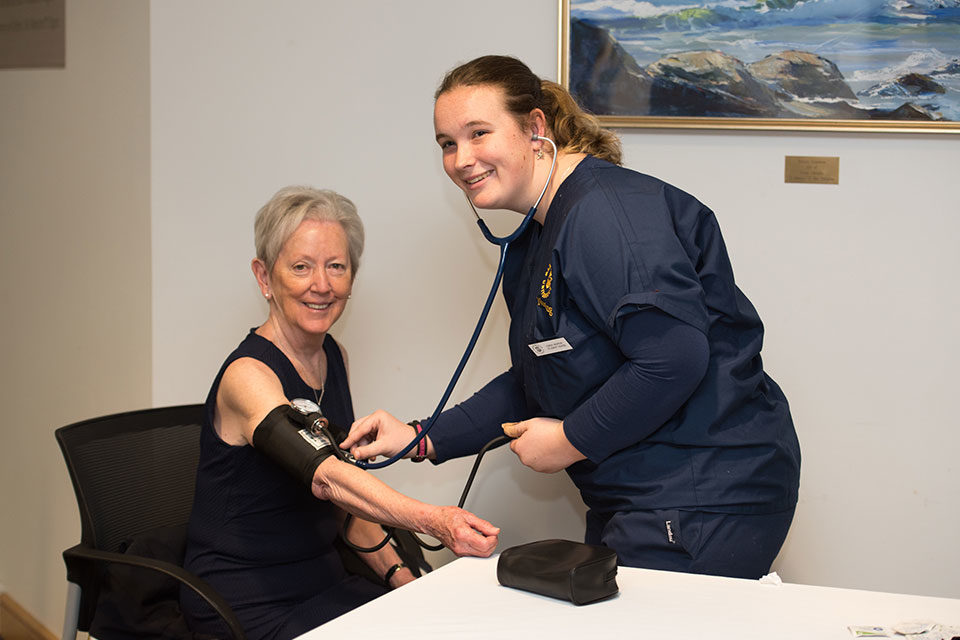
Nursing is always a vital field, but never has this been so apparent than during a pandemic. And while nurses across the country are on the frontlines of fighting an unseen battle within health care, Salve Regina’s nursing program continues to carry on its promise of ensuring a high-quality education to nursing students no matter the remote challenges that higher education is facing, as well as offering vital community support.
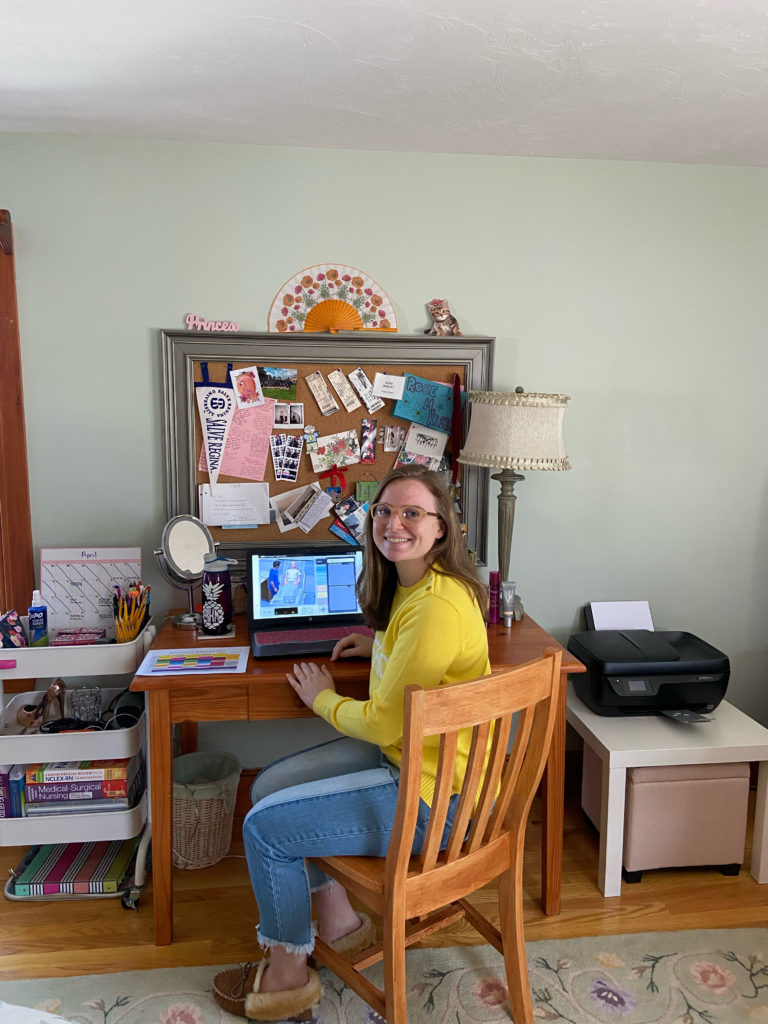
Rose Klein ’20 sitting at her desk studying in Scituate, MA. “I choose the nursing program at Salve Regina because I was intrigued by the variety of classes they offer,” she said. “Although nursing programs provide very similar classes, the order in which Salve Regina structures the classes seemed like the best fit for me.”
Tireless teaching through remote learning
Including both undergraduate and graduate programs, the Salve Regina nursing department has about 425 or so nursing students across the four programs of nursing offered by the department. According to Debra Cherubini, chairwoman of the nursing program, the transition to remote learning for so many students has gone very well. Salve Regina is a smaller university with a tight-knit community, and this has been helpful during such an unprecedented upheaval.
“Students and faculty have worked very hard to transition to the online format, and the Information Technology department has done a wonderful job supporting our courses and technology needs,” said Cherubini. “The students are doing well. I think they’re certainly challenged like they normally would be, but I think the fact that they’re still getting to meet with their professors every week is extremely helpful.”
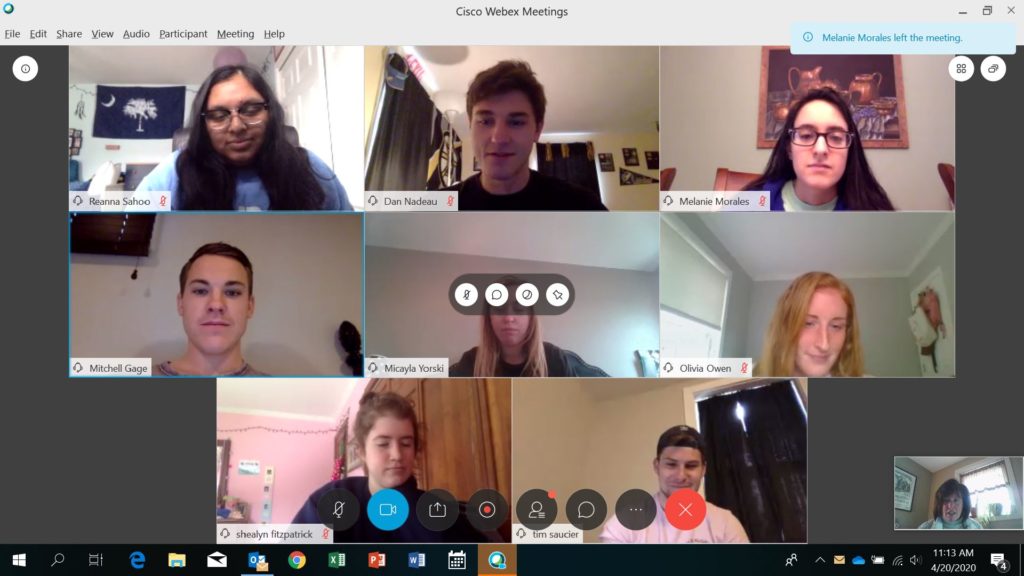
A photo of Terri Legare, lecturer in the nursing program, meeting with senior level clinical students over WebEx.
The faculty in the nursing department are doing their best to maintain courses as scheduled to keep their students grounded. If a class is scheduled to meet at a certain time, then that class is happening through WebEx at the time it’s supposed to meet. If students are supposed to be learning outside of a classroom, then professors are trying to make sure that independent learning is going well.
“For the most part, I’ve been impressed by students,” said Mary Lou Lyons, lecturer and assistant chairwoman of the nursing program. “I can imagine that being at home is distracting, and it takes a certain amount of discipline to stay involved.”
Because Salve Regina’s nursing program has small class sizes, the professors know their students. So now when students have questions, they confidentially know they can ask for help, because the nursing professors are going out of their way to support them virtually by being available for long hours.

Lindsey Corrente, adjunct faculty for the nursing program and emergency services manager at South County Health, shared this picture of students finishing up a clinical rotation that she helped supervise. “You really get to watch their progress through the nursing program,” said Corrente. “As a mentor and an educator, there’s really something valuable in that, because you really get to see those skills grow over time and how that foundation developed.” Students are Ashley Parkinson ’21, Erin Looney ’21, Michelle Frias ’21, Hannah Sousa ’21, Caroline Vincent ’21, Alexa Carranzo ’21.
“I get on my computer at 7:30 a.m., and I probably won’t get off until about 5 or 6 tonight,” described Michelle McCarthy, lecturer of nursing and the Student Nurse Organization’s advisor. “That’s our current reality, but we want to be available to the students as much as possible. I’m happy that the Salve community has come together and are making sure the students, staff and faculty are making it through as best as we can.”
The nursing professors are very supportive of their own faculty. They are meeting every week as faculty to make sure that everyone on staff feels supported, too. It’s making a big difference, according to Terri Legare, lecturer in the nursing program.
“That has really kept us connected us with another and helped us with the communication and still feel part of the group,” said Legare.
Using nursing virtual simulations to tackle online learning
Because nursing is so hands-on, especially during clinical training, the biggest challenge the nursing program faces is how to replace that vital bedside learning. Their solution has been virtual simulations using vSim for Nursing through a company called Wolters Kluwer.
Through vSim for Nursing, Students log on to the site and can practice treating virtual patients with a variety of conditions by practicing how they would respond to situations in real life. Depending on the choices of the nursing student, the patient will get better or worse; once the simulation is over, the student will be given feedback and a score.
Video: Michelle McCarthy, lecturer of nursing and the Student Nurse Organization’s advisor, created this vSim demo to showcase how a nursing student engages with the virtual simulations.
Several professors say that, while not the same as bedside instruction during clinicals, virtual simulations still challenge students. “They get patients with serious complications, whereas in the real world, no one says, ‘Let’s let the nursing student take care of the sickest patient,’ ” described Lyons.
“The assignments associated with the virtual simulations help to examine the students’ thought processes – something that we’d do in the clinical area as a post-conference at the end of the day,” added Legare. “It really helps the student to develop their thinking about why they made decisions.”
Clinical training usually takes 7.5 hours of work each day. Virtual simulation work takes about 5 hours each day for students, in addition to other assignments nursing professors are using to fill up the time. For seniors, they will still be able to graduate on time as long as they complete as many clinical hours as they would in a traditional clinical setting, according to the Board of Registration for Nursing in Rhode Island.
So far, students are responding positively to remote learning changes such as vSim for Nursing. While it is not the same as real life clinical work, they see virtual simulations as a great learning tool that is still challenging them to learn and grow.
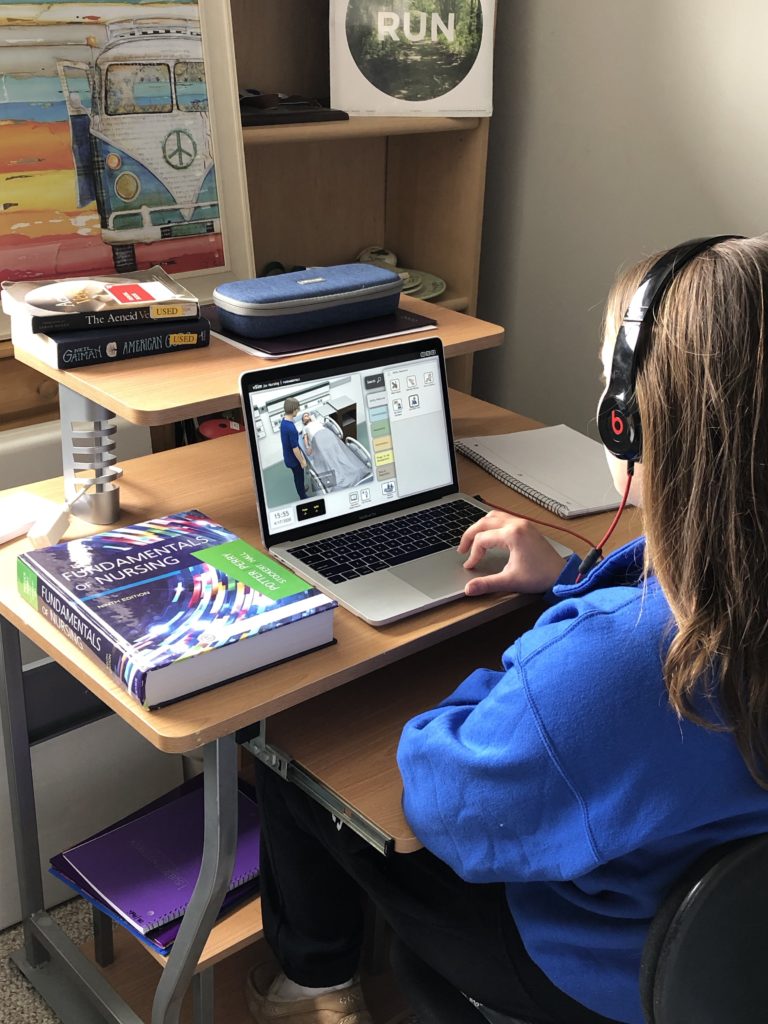
Jillian LeBeau ’21 sits at the computer doing virtual simulation learning. “I choose to attend Salve due to the reputation of their nursing program,” she said. “I knew this was the program for me.”
“It’s a good substitute to the real thing with the added benefit of allowing us to make mistakes that, because it is not a real patient, will have no true detrimental impact,” said Jillian LeBeau ’21. “I like how the information from these simulation scenarios and the skills and interactions learned can be applied to real life patients that we will take care of in the future.”
Rose Klein ’20 likes that with vSim for Nursing, she gets direct feedback as to how her choices would have affected the patient. “We can evaluate our process right away, and in the clinical setting it can take some time to get your clinical instructor to verify your nursing care process,” she said.
Serving communities across the country through nursing
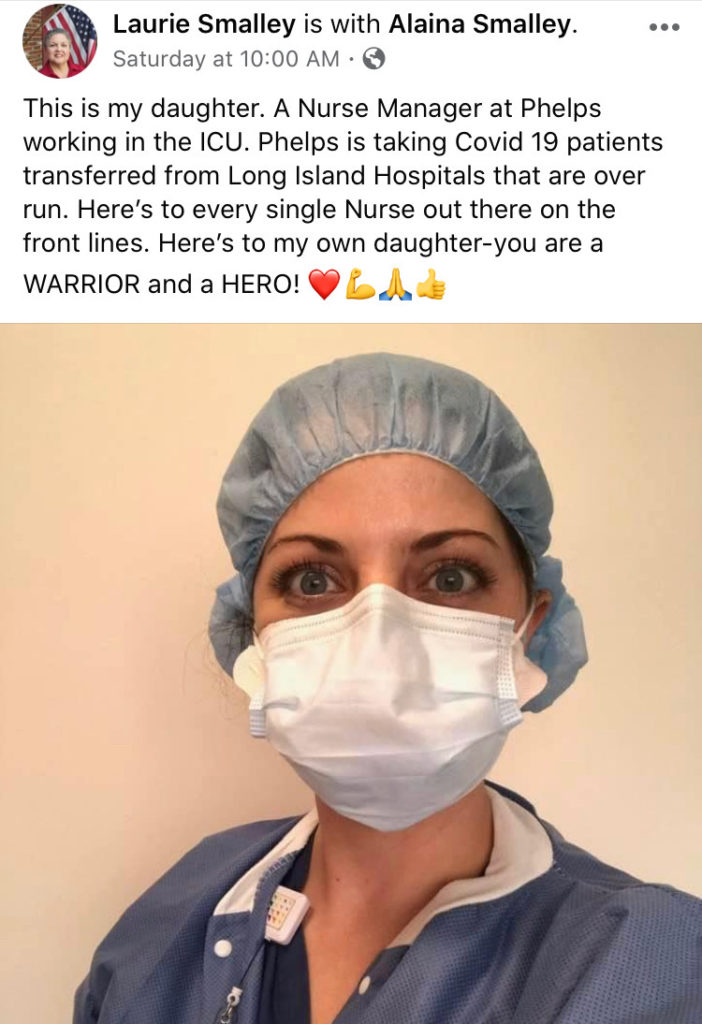
Alaina Smalley ’09 is working tirelessly on the frontlines of the coronavirus pandemic. This post was shared by the Office of Admissions.
One of the many amazing features of the Salve Regina nursing program are their 3G high intensity mannequins that help students have experiential, high-touch learning at the bedside before they enter the clinical environment. These mannequins are very complex and do everything a person would do such as bleed, sweat and go into cardiac arrest.
While nursing students are currently not on campus, Salve Regina is partnering with Newport Hospital to support intubation training for physicians using the mannequins.
“Unfortunately, people who get the COVID-19 virus end up possibly going on a ventilator,” said Cherubini. “These doctors were here using the simulation lab to do intubation training to be prepared for the healthcare needs of their patients.”
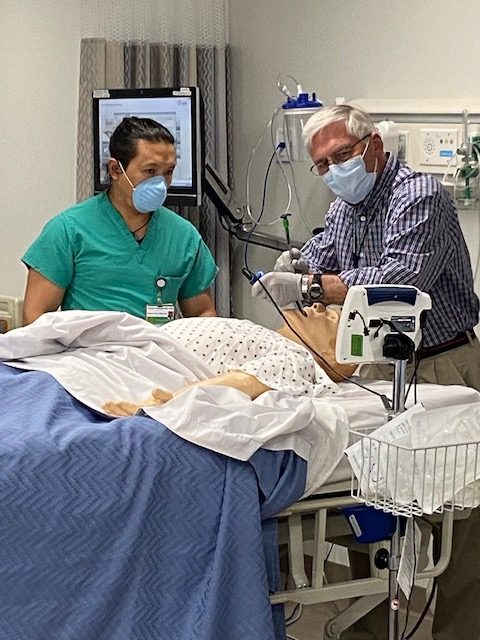
Physicians from Newport Hospital practice intubations on Salve Regina’s high intensity mannequins that the nursing program usually uses for experiential student learning.
The nursing program is also working with the Department of Elderly Affairs and providing respite opportunities for families with individuals who either have handicapped children, handicapped adults or elderly individuals that need respite care. The nursing department has approximately 58 various clinical locations that they partner with to support clinical training for students.
Thousands of nursing alumni who’ve graduated from the Salve Regina program are responding to the crisis all over the country – including Jenna Boyle ’19, a nurse who has been working at Rhode Island Hospital in Providence since October 2019 in oncology and will now be working on a COVID-19 unit indefinitely. Even though Boyle is new to nursing, she has felt confident entering the field because of her training at Salve Regina – even during a pandemic.
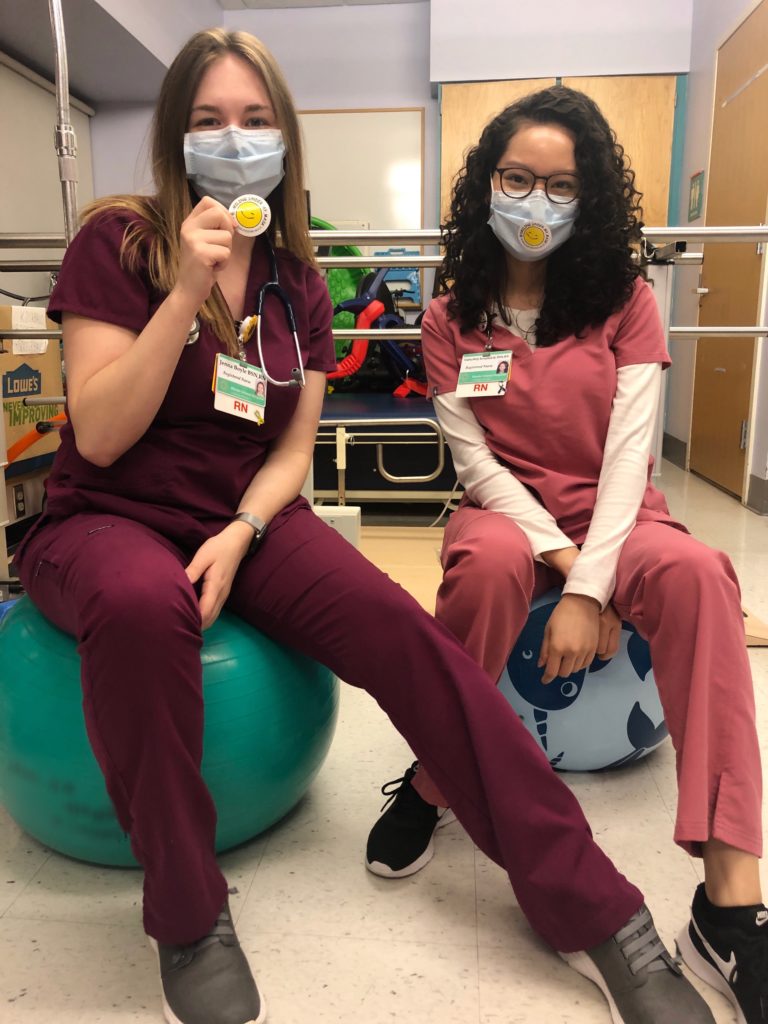
Jenna Boyle ’19 and Nin Keophakdy ’19 are alumni working at Rhode Island Hospital in Providence during the present coronavirus pandemic. The stickers say, ‘Smiling Under My Mask,’ an initiative going on at the hospital.
“Every day you go into work, and policies are different and rules are different, and you … have to adapt every day, which is something we learned in nursing school,” Boyle described. “It’s not that we haven’t been scared, but despite being scared, we’ve stepped up.”
Boyle said that every aspect of nursing has been affected by the pandemic, but she also thinks it’s important to remember that the pandemic won’t last forever. She meets a lot of current nursing students who are feeling uncertain of the future, but she knows this is only temporary.
“Hang tight, because this isn’t something we’ll be dealing with every year,” she said. “Get involved and learn as much as you can during these once-in-a-lifetime experiences.”
And it’s this positive approach to learning no matter what that seems to run through the program at Salve Regina. “As nurses, we are considered to be lifelong learners, and I find that the Salve Regina nursing program has instilled this value in me,” said current student Klein.
View this post on Instagram
Video: Alyssa Gomez ’15 (pictured far left) was part of this video created by nurses in the ICU at Massachusetts General Hospital. It was shared on the “Ellen Show.”
Check out stories every Tuesday that showcase the world of academics at Salve Regina and how faculty, programs and students are innovating with remote living and learning during Virtual Salve. #academictuesdays #salvesgotthis

